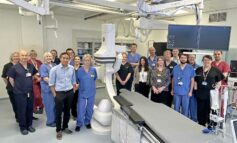The West of England NHS Genomic Medicine Centre (WEGMC) has now enrolled 1,000 patients and family members from across the region to take part in the 100,000 Genomes Project.

Nicola Windless, from Midsomer Norton, and her family have joined the ground-breaking initiative, which is the largest national genome sequencing project of its kind in the world.
Nicola’s twin daughters, Kayleigh and Michelle, have an undiagnosed condition and Nicola hopes that research like 100,000 Genomes can help provide some answers.
“Kayleigh and Michelle have global learning difficulties and epilepsy and we want to know more about their condition and whether there is a genetic link.
“I’ve always been optimistic about our situation but it’s the factor of the unknown which can be a struggle. I know that the project may not give us all the answers but I strongly believe that the more you know, the better so that’s why my daughters, my husband Paul and I have enrolled on this important project,” said Nicola.
Professor Andrew Mumford, clinical director of the WEGMC, said: “Thanks to the support of people like Nicola and her family and hospitals across Bristol, Bath and Gloucestershire, we have been able to achieve this significant milestone for our Genomic Medicine Centre.
“The enthusiasm around the project from patients, and their families, and the healthcare community has been incredible and we are thrilled to be part of this very important initiative that will help shape the future of personalised medicine in the NHS.”
The 100,000 Genomes project is a major NHS initiative that aims to sequence 100,000 genomes from patients with rare inherited diseases or with cancer and to transform NHS services to include genome sequencing as standard care for future patients.
A genomics medicine centre was established in the West of England at the end of 2015 to enable access to this service for patients and their families across region.
Professor Dame Sally Davies, chief medical officer of NHS England, recently called on the NHS to make genome sequencing as standard as blood tests and biopsies for people with cancer, rare diseases and infections.
Genome sequencing could result in more personalised treatment for patients and faster diagnoses for people with rare diseases.



